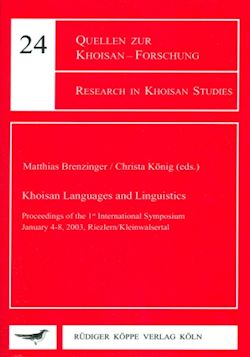
Khoisan Languages and Linguistics – 1st Symposium 2003
Proceedings of the 1st Int. Symposium, January 4–8, 2003, Riezlern/Kleinwalsertal
Edited by: Matthias Brenzinger, Christa König. With contributions by: Herman M. Batibo, Matthias Brenzinger, Anderson M. Chebanne, Edward D. Elderkin, Rosalie Finlayson, Tom Güldemann, Wilfrid H.G. Haacke, Henry J. Honken †, Roland Kießling, Christa Kilian-Hatz, Christa König, J.A. Louw, Amanda Miller, Hitomi Ono, Bonny Sands, Hessel Visser. Series edited by: Rainer Voßen.
Series: QKF Research in Khoisan Studies Volume 24
2010362 pp.
1 colour map, 8 b/w maps, 1 colour photo, 10 oscillograms, 4 diagrams, 46 tables
Text language(s): English
Format: 160 x 240 mm
620 g
Paperback
€ 69.80
Buy 'Khoisan Languages and Linguistics – 1st Symposium 2003' as a downloadable PDF document directly from our online shop »
Order 'Khoisan Languages and Linguistics – 1st Symposium 2003' as print edition »
The First International Symposium on Khoisan Languages and Linguistics in Riezlern/Kleinwalsertal, Germany was organized by Bernd Heine (University of Cologne) and Rainer Vossen (Goethe University of Frankfurt/Main) in January 2003. This symposium turned out to be the first of a – in the meantime – well established series of regular academic meetings on Khoisan linguistics. Worldwide leading scholars attend these meetings on invitation.
“The genealogical affiliation of the non-Bantu and non-Cushitic click languages of Africa is still under debate, in particular whether they all form a coherent linguistic lineage referred to as ‘Khoisan’. The Khoe family [...] plays an important role in this respect, for several reasons. In general, it has a special place in the history of African linguistic classification, because its Khoekhoe branch, formerly known as ‘Hottentot’, was intricately associated with Meinhof’s ‘Hamitic theory’ and was decisive in showing its ultimate untenability. Khoe is important within Khoisan, too, because it is the largest linguistic unit of a clearly genealogical nature and comprises the majority of attested languages subsumed under Khoisan. One consequence of this is that attempts towards Khoisan-internal classification beyond the level of obvious families have to focus on the properties of Proto-Khoe, which may reach back in time ca. 2000 years.” (Güldemann / Elderkin in this volume).
The articles of the volume deal with aspects of three different linguistic fields, i.e. language description (Miller, Kilian-Hatz, König, Visser, Kiessling, Ono), genetic classification (Güldemann / Elderkin, Sands) and sociolinguistics (Batibo, Chebanne and Brenzinger).
CONTENTS
J.A. Louw / Rosalie Finlayson: A tribute to Jan W. Snyman (8th July, 1941 – 23rd June, 2002)
Tom Güldemann / Edward D. Elderkin: On external genealogical relationships of the Khoe family
Amanda Miller: A prosodic account of Ju|’hoansi consonant distributional asymmetries
Bonny Sands: Juu subgroups based on phonological patterns
Christa Kilian-Hatz: Serial verb constructions vs. converbs in Khwe
Christa König: Serial verb constructions in !Xun
Hessel Visser: Verbal compounds in Naro
Wilfrid Haacke: Naro Syntax from the perspective of the desentential hypothesis – The minimal sentence
Roland Kiessling: Sandawe verbal plurality
Hitomi Ono: |Gui kinship verbs? Verbs and nouns in |Gui and linguistic differences found among its kinship terms
Herman M. Batibo: Taking the best of both worlds – Integration and identity among the Khoesan speakers of Botswana
Andy Chebanne: Convergence, identity shifting and language loss in Eastern Khoe
Matthias Brenzinger: The exodus of Khoisan speech communities from Angola
Henry Honken: A Khoekhoegowap dictionary
The proceedings volumes of previous Int. Khoisan Conferences as well as of the ones held in Riezlern in 2006, 2008, 2011 and 2014 have been published in the same series, see the following links:
Accompanying material:
- Khoisan Languages and Linguistics – 2nd Symposium 2006
(ISBN 978-3-89645-150-7 ) - Khoisan Languages and Linguistics – 3rd Symposium 2008
(ISBN 978-3-89645-873-5 ) - Khoisan Languages and Linguistics – 4th Symposium 2011
(ISBN 978-3-89645-880-3 ) - Khoisan Languages and Linguistics – 5th Symposium 2014
(ISBN 978-3-89645-878-0 ) - Language, Identity, and Conceptualization among the Khoisan
(ISBN 978-3-89645-143-9 )
Cross-reference:
- A Concise Dictionary of Northwestern !Xun
(ISBN 978-3-89645-149-1 ) - Folktales of the Kxoe in the West Caprivi
(ISBN 978-3-89645-081-4 ) - Khwe Dictionary
(ISBN 978-3-89645-083-8 ) - Linguistics across Africa
(ISBN 978-3-89645-510-9 ) - Lone Tree – Scholarship in the Service of the Koon
(ISBN 978-3-89645-227-6 ) - Namibian Languages
(ISBN 978-3-89645-080-7 ) - Sprachen und Sprachzeugnisse in Afrika
(ISBN 978-3-927620-95-7 ) - The !Xun Language
(ISBN 978-3-89645-877-3 ) - The Complete Linguist
(ISBN 978-3-927620-84-1 )
| « back | Print version | [top] |
 Books
Books Audio
Audio Biographies
Biographies Series
Series Festschrifts
Festschrifts Journals
Journals